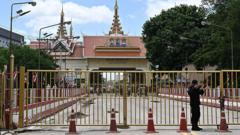The French government's assertion that a scientist was barred from entering the U.S. for expressing political views has sparked debate, countered by U.S. officials, insisting the motive was based on security protocols regarding sensitive information.
U.S. Denies Claims of Political Motive in Scientist's Deportation

U.S. Denies Claims of Political Motive in Scientist's Deportation
The U.S. Department of Homeland Security clarifies that the refusal of entry for a French scientist was due to the possession of confidential information, not political opinions about the Trump administration.
The recent incident involving a French scientist denied entry into the United States has raised questions about academic freedom and political bias. The Department of Homeland Security (DHS) has firmly denied claims from the French government that the refusal was politically motivated. According to U.S. official Tricia McLaughlin, the scientist was stopped at the border due to the presence of confidential data from Los Alamos National Laboratory on his electronic device—a violation of a nondisclosure agreement. "This is not about political beliefs but security protocols," McLaughlin asserted.
The scientist, specializing in outer space research, was en route to a conference in Texas when he was turned away. French Higher Education Minister Philippe Baptiste stated that the scientist was prevented from entering the U.S. based on exchanges on his device that reflected personal opinions about President Trump’s scientific policies. This perspective has prompted significant backlash from the French academic community, who see this incident as a troubling infringement on academic freedom.
Baptiste reiterated his stance on the political nature of the incident, describing it as "extraordinarily atypical" and expressing concern over the implications for freedom of thought and expression. While he acknowledged the sovereignty of each nation to control their own borders, the French Academy of Sciences voiced its disapproval, warning that such actions could undermine fundamental academic liberties.
Despite the controversy, the specifics surrounding the scientist's prior interactions with Los Alamos remain unclear, and both sides have yet to reach a consensus on the reasons for the entry denial. As diplomatic discussions continue, the case highlights the delicate balance between national security and the preservation of academic freedom in an increasingly polarized global environment.
The scientist, specializing in outer space research, was en route to a conference in Texas when he was turned away. French Higher Education Minister Philippe Baptiste stated that the scientist was prevented from entering the U.S. based on exchanges on his device that reflected personal opinions about President Trump’s scientific policies. This perspective has prompted significant backlash from the French academic community, who see this incident as a troubling infringement on academic freedom.
Baptiste reiterated his stance on the political nature of the incident, describing it as "extraordinarily atypical" and expressing concern over the implications for freedom of thought and expression. While he acknowledged the sovereignty of each nation to control their own borders, the French Academy of Sciences voiced its disapproval, warning that such actions could undermine fundamental academic liberties.
Despite the controversy, the specifics surrounding the scientist's prior interactions with Los Alamos remain unclear, and both sides have yet to reach a consensus on the reasons for the entry denial. As diplomatic discussions continue, the case highlights the delicate balance between national security and the preservation of academic freedom in an increasingly polarized global environment.






















